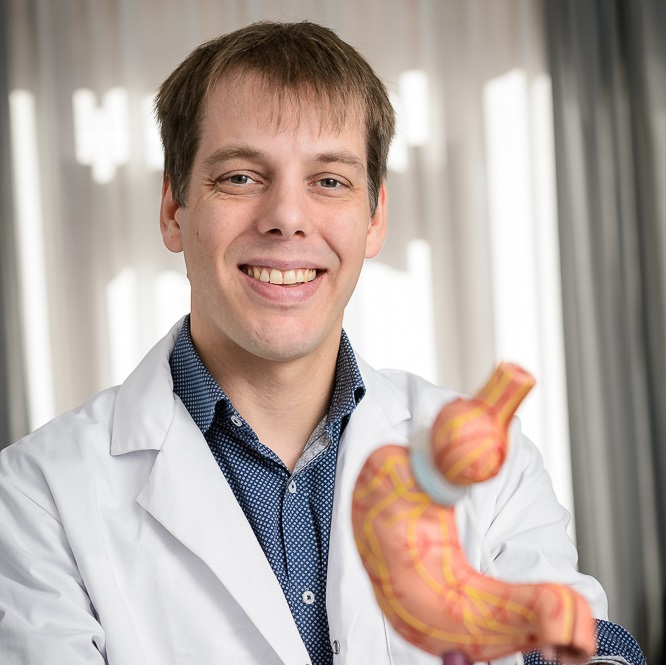Colon cancer
Colon cancer is a collective term for cancers of the small intestine, large intestine and rectum (colorectal cancer), although the term is mostly used for cancer of the large intestine. It is the second most common cancer among women and the third most common among men. Colon cancer afflicts approximately 5,000 Belgians a year, most of whom are aged over fifty.
Large intestinal cancer, small intestinal cancer and colorectal cancer
Colon cancer usually refers to large intestinal cancer or colorectal cancer, i.e. a malignant tumor is located in the large intestine (colon + rectum). Small intestinal cancer, where the tumor located in the small intestine (duodenum + jejunum + ileum) is rather rare.
Causes and risks
For most patients, colon cancer can’t be reduced to one single cause. Mentioned below are the most common risk factors. Please consult with your doctor to learn more about your personal risk.
- Familial predisposition. In 5 to 10% of all cases, familial predisposition plays a major role.
- Genetics: in 5% of all cases, the cancer is caused by a genetic anomaly.
- Age: colon cancer is more common after the age of 50.
- The presence of benign polyps on the intestinal mucosa.
- Medical history: patients who have already been afflicted by colon cancer at least once before run an elevated risk.
- Chronic colon infections such as Crohn’s disease.
- Lifestyle: bad eating habits (not eating enough vegetables, fruit and fiber combined with a diet that contains excessive amounts of saturated fat, alcohol and red or processed meat), excess weight, smoking and a sedentary or inactive lifestyle all contribute to the risk of developing cancer.
Colon cancer: discomfort and symptoms
Colon cancer can cause several types of discomfort and can have multiple symptoms (which are nevertheless not exclusive to colon cancer).
- Blood loss through the anus
- Change in stool tempo
- Tiredness
- Inexplicable weight loss
- Persistent abdominal pain
While none of the symptoms mentioned are necessarily caused by colon cancer, we do recommend to consult with your doctor if you recognize any of them!
Diagnosis
The earlier colon cancer is discovered, the higher the chance of full recovery. Therefore, early diagnosis is crucial. Once the presence of cancer has been established, finding out more about its nature and identifying how far it has spread is key. This process is called staging. It provides your physician with crucial information to determine the best possible treatment for you. As such, additional tests may be required.
Colon cancer treatment
The final treatment of colon cancer differs from patient to patient and depends on several factors. Your doctor will decide which treatment is appropriate for you.
How large is the cancer?
Small tumors can usually be removed locally by your surgeon (local resection, trans-anal endoscopic micro-surgery). Usually, a part of the cancer-free tissue is also removed to make sure no cancer cells stay behind.
When the cancer is larger, a part of the bowel or the rectum is removed (colectomy or meso-rectal excision). Cancer to the large intestine may block your bowels completely (bowel obstruction).
Where is the cancer located in the abdomen and which type is it?
The exact location of the cancer determines which operation is advised:
- Open surgery versus laparoscopy
- Anterior resection, colo-anal anastomosis
- Abdominal resection
How far has the cancer metastasized?
Unfortunately, colon cancer can spread over the entire body. Especially the liver and lungs are at risk. Depending on the number of metastases, they will be removed surgically, treated with chemo-therapy of removed by specialized surgery.
